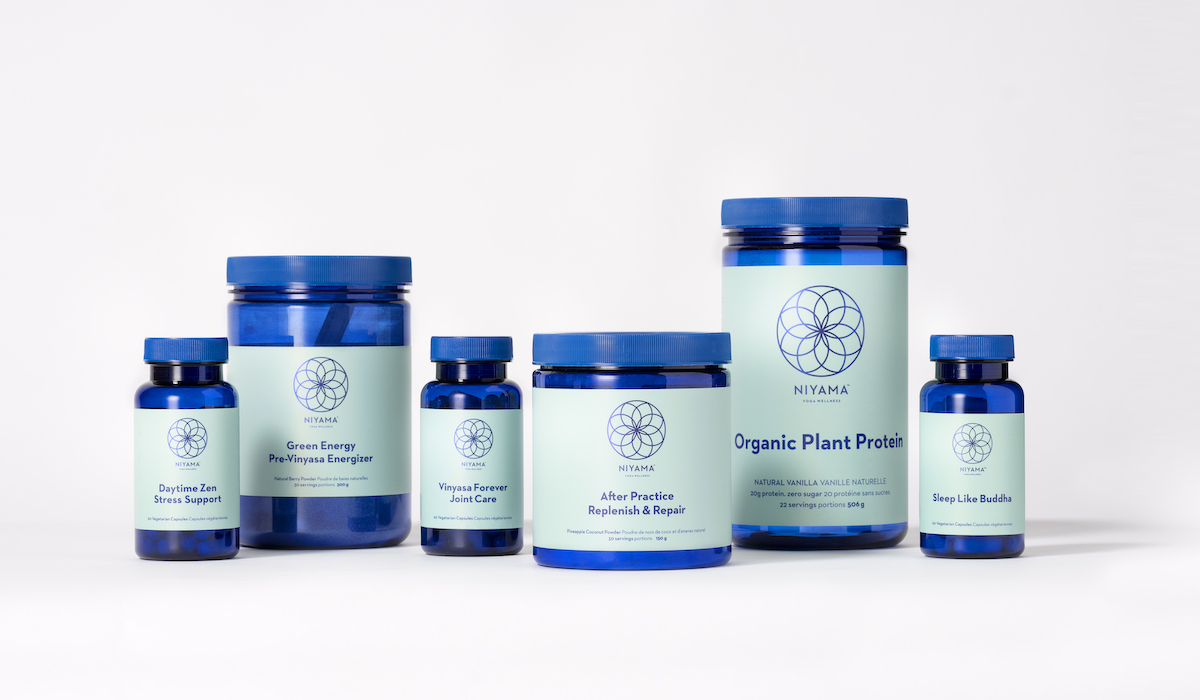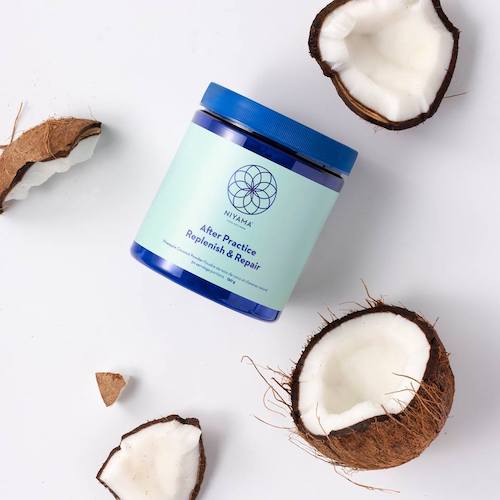We spoke with Jillian Mariani, founder and general manager of Niyama Yoga Wellness, about nutrition and wellness for yogis.
What inspired you to create Niyama Yoga Wellness?
Jillian: I started practicing yoga around the same time I started my career in the natural health products category in Canada—over 20 years ago!
Like many, I first came to yoga looking for an exercise regimen that I would actually enjoy; I just wasn’t a gym girl. I was immediately hooked on both the physical and emotional benefits of a sweaty, vigorous class and I haven’t been back to a gym since.
I had an amazing 20-year corporate career in sales, marketing and innovation with some of the best natural health brands in Canada. I worked with incredible teams and inspiring mentors, learning so much. With young kids and a demanding work schedule, I did a lot less yoga but still went when I could and also practiced at home.
In 2017, I left my corporate role as Vice President of Marketing at Jamieson Wellness to take time with my family – I was really burnt-out and knew I needed to figure out a new path. I’d always wanted to take a Yoga Teacher Training course, not necessarily to teach but to deepen my own practice.
It was during that physically demanding course (I was in my mid 40’s, not my 20’s!) that I realized the combination of supplements and nutrients I was using to maintain my health and support my needs before and after yoga really wasn’t common knowledge.
Plus, a lot of active yoga practitioners and teachers follow a plant-based lifestyle, making their protein needs more challenging to meet. It was my lightbulb moment – I could combine my love for yoga with my passion and knowledge for natural health, actually helping to make yogis healthier and, just maybe, even happier!
What are the unique nutritional needs of yogis and aspiring yogis?
The nutritional needs of yogis aren’t greatly different from other active people. With enough research, it’s possible to create your own regimen by combining some great products already out there—but Niyama was an opportunity to create something designed specifically for yogis, to take all the guesswork out of it.
Yogis are more likely to follow a plant-based diet, so I wanted the line to be vegan, free of soy and without any artificial colours, flavours, sweeteners or preservatives. Having Niyama made in Canada was also important to me.
In terms of nutrition, Niyama offers a pre-practice powder you add to water and drink before class (Green Energy Pre-Vinyasa Energizer). It contains alkalizing greens, lots of antioxidants and natural non-caffeinated energy in a seriously delicious sugar-and-calorie-free drink.
You can focus on forward-bends, twists and inversions without the nausea or heartburn that can happen after coffee.
Niyama also offers a luscious pineapple-coconut After-Practice drink mix to provide electrolytes and vegan aminos after a sweaty practice, which can help reduce muscle fatigue—again, without sugar, calories or artificial.
To compliment plant-based lifestyles, I developed a plant protein made with organic peas that is smooth, creamy and not too sweet.
Niyama also offers three products in capsule form: a natural anti-inflammatory to support healthy joints (Vinyasa Forever Joint Care), a melatonin-free natural sleep product (Sleep Like Buddha) and Daytime Zen Stress Support, which combines my favourite adaptogens and can be taken daily to help extend the stress-fighting benefits of physical yoga into our off-mat lives.
What are adaptogens?
Adaptogens are nutrients that help the body adapt to and deal with stress. Because stress is unavoidable, having lifestyle and nutritional strategies to minimize the impact on your health is really important.
These nutrients, usually sourced from the roots of herbs, work with the adrenal glands and brain to help reduce mental and physical fatigue, improving energy, stamina and mental focus.
Daytime Zen combines the ayurvedic herbs Ashwagandha and Rhodiola with another adaptogen, Bacopa, as well as the amino L-theanine (found in green tea). Best taken first thing in the morning on an empty stomach – however, if you are on any prescription meds for anxiety, you would definitely want to talk to your doctor first.

Jillian holds a BA from UofT, a diploma in Nutritional Management from GBC, an MBA from Schulich School of Business, and a YTT-200H from Downward Dog Yoga Centre.
She lives in Toronto with her family, teaches Vinyasa part-time and is the founder and general manager of Niyama™ Yoga Wellness.
In addition to yoga, she enjoys cooking with her Italian husband, travel, Game of Thrones, good books and turmeric lattes, dark chocolate, and beach walks.



